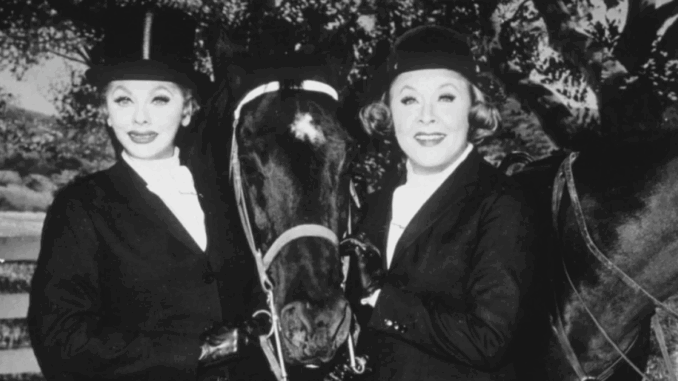
If there’s one I Love Lucy episode that transcends time, culture, and language, it’s “Job Switching.” First aired on September 15, 1952, the episode is best known for its iconic candy factory scene—Lucy and Ethel frantically stuffing chocolates into their mouths, hats, and blouses as the conveyor belt spins wildly out of control.
But this episode is more than a slapstick masterpiece. It’s a near-perfect capsule of what made I Love Lucy revolutionary: gender commentary wrapped in physical comedy, razor-sharp timing, and two women (Lucille Ball and Vivian Vance) who could turn chaos into chemistry.
A Premise as Modern as Ever
The episode’s setup is deceptively simple: Lucy and Ethel argue that working outside the home is just as difficult as housework, while Ricky and Fred claim domestic chores are harder. So, the couples agree to switch roles for a day.
On paper, it’s a 1950s take on a classic marital argument. But what makes the writing so sharp is how quickly the episode dismantles the characters’ assumptions—not just for laughs, but for truth. Lucy and Ethel don’t just struggle at the chocolate factory because the job is fast-paced. They fail because the expectations placed on them, the strict timing, the lack of training—all mirror what many women were experiencing in real life when entering the workforce after WWII.
Meanwhile, Ricky and Fred fumble with cooking, laundry, and ironing. In the hands of lesser actors, this might feel like a gendered parody. But Desi Arnaz and William Frawley’s straight-faced commitment to their failure—and Lucy and Ethel’s explosive reactions—make it hilarious without punching down.
The Chocolate Scene Was More Than Just Slapstick
Lucille Ball’s ability to manipulate her body for comedy is already legendary, but “Job Switching” contains what might be her most perfectly executed moment. As the chocolates begin to outpace her, Lucy’s desperation moves from wide-eyed confusion to pure panic, with Ball chewing and hiding candies with increasing absurdity.
What’s often overlooked is how real this scene was. The conveyor belt was built by hand. The chocolates were real. And Ball and Vance had no idea how fast the belt would go during filming. That genuine surprise and improvisation created a moment so believable and physical that it’s taught in comedy classes to this day.

The scene worked because of timing, yes—but also because Lucy and Ethel weren’t mocking working women. They were the audience. They were the women who’d been tossed into chaotic new roles with zero training or appreciation. The scene wasn’t about failure. It was about what happens when people aren’t given the support they need—and still try to keep going anyway.
Vivian Vance’s Best Work?
While Lucy gets the most attention (and deserves it), Vivian Vance’s performance in this episode is just as essential. As Ethel, she’s often the steady one. But here, Vance shows off her own comedic brilliance. Her timing in the factory is tight. Her ability to play off Lucy—never overdoing it, never fading—is the very definition of a comedy partner.
Her line delivery, body language, and facial reactions make her not just a sidekick, but a co-lead. “Job Switching” is one of the clearest examples of why Lucille Ball insisted that Vivian Vance be cast in the show, despite CBS’s resistance to her being too young and too glamorous to play Fred Mertz’s wife.
Social Commentary in Disguise
It’s easy to watch “Job Switching” and focus on the laughs. But beneath the slapstick is something deeply subversive. The episode takes the domestic battles of the time and flips them on their head. By the end, both couples have gained a little humility, but the women still face higher stakes.
Ricky and Fred’s cooking disaster is cleaned up with a quick apology. Lucy and Ethel’s factory failure nearly gets them fired. The message? Women entering the workforce were judged more harshly—and had more to lose.
That message still rings true, decades later. And that’s why the episode still lands—not just as comedy, but as commentary.
Legacy of “Job Switching”
Ask any I Love Lucy fan—or even a casual viewer—to name an episode, and “the candy factory one” is usually the first. It’s been referenced in Friends, The Simpsons, The Golden Girls, and countless other shows.
But its real legacy is this: over seventy years later, in an era of endless television content, no sitcom has ever topped the combination of physical comedy, social wit, and honest emotion that “Job Switching” delivers in just 23 minutes.
It’s not just a classic. It’s the blueprint.